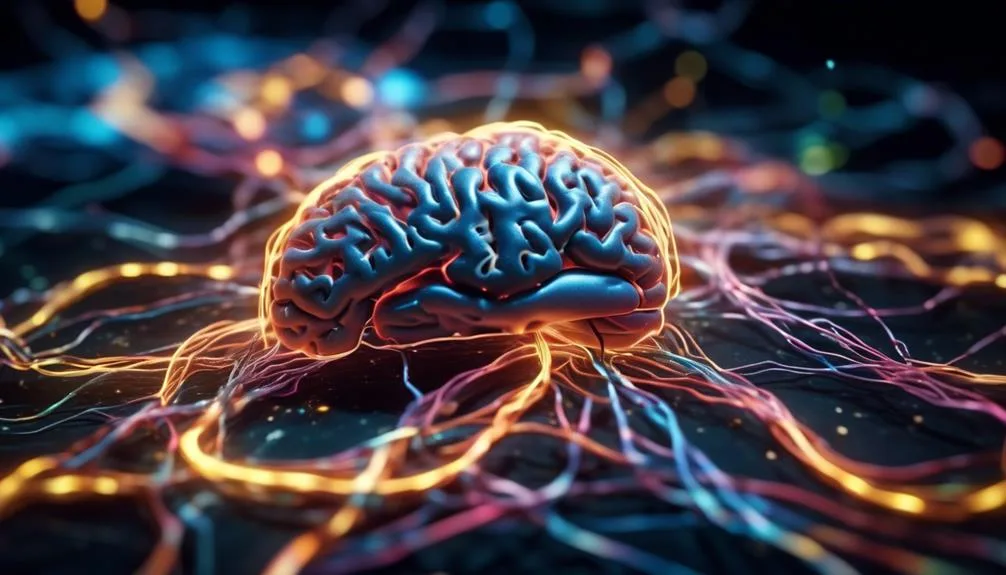Are you ready to uncover the keys to unlocking optimal flow?
In this discussion, we will take a closer look at the captivating research of Mihaly Csikszentmihalyi and explore the concept of flow – that state of complete immersion and peak performance.
You'll discover how Csikszentmihalyi's journey led him to the groundbreaking understanding of flow and the eight key characteristics that define it.
But that's not all, we will also delve into the factors that influence flow and the role of the brain in this extraordinary state.
Get ready to embark on a journey of self-discovery and learn the strategies to tap into your full potential.
Key Takeaways
- Mihaly Csikszentmihalyi's interest in happiness led him to explore the concept of flow.
- Flow is characterized by complete concentration, clarity of goals, and intrinsic reward.
- Flow capacity differs among individuals and can be influenced by personality traits and emotions.
- The prefrontal cortex plays a role in flow, with decreased activity during the state of flow.
Csikszentmihalyi's Journey to Flow
Csikszentmihalyi embarked on a transformative journey to understand the concept of flow and its impact on human happiness and optimal experience.
Born in Hungary, Csikszentmihalyi's background in art, philosophy, and religion sparked his curiosity about what makes life meaningful. This led him to the field of psychology, where he focused on happiness and the psychology of optimal experience.
In his book 'Flow: The Psychology of Optimal Experience', Csikszentmihalyi shares his findings from interviews with athletes, musicians, and artists. He discovered that flow is a state of complete concentration, clarity of goals, and immediate feedback. It involves the transformation of time, intrinsic reward, effortlessness, and a balance between challenge and skills.
Csikszentmihalyi's background and curiosity laid the foundation for his groundbreaking research on flow and its impact on human happiness.
The Characteristics of Flow

Flow is characterized by complete concentration on the task at hand, clarity of goals, and immediate feedback. Achieving focus is crucial in experiencing flow. It requires blocking out distractions and fully immersing yourself in the activity.
When you're focused, you enter a state where time seems to transform. Hours can feel like minutes, and you become completely absorbed in the present moment. This time transformation is a key characteristic of flow. It allows you to lose track of time and fully engage in the task, enhancing your performance and enjoyment.
Additionally, clear goals and immediate feedback contribute to flow. Having a clear direction and knowing how well you're doing provides a sense of purpose and helps you stay in the flow state.
Factors Influencing Flow

Factors that influence the experience of flow vary among individuals and can be influenced by personality traits and emotional states. Here are some key factors that can impact flow:
- Flow capacity differences: People have different levels of natural ability to experience flow. Some individuals may find it easier to enter a flow state, while others may struggle to achieve it.
- Impact of anxiety: Anxiety can hinder the ability to enter a flow state. When you're feeling anxious or stressed, it can be difficult to fully focus and engage in an activity, which is essential for experiencing flow.
- Personality traits: Certain personality traits, such as openness to new experiences and a willingness to take risks, can positively influence the likelihood of experiencing flow. These traits can contribute to a greater sense of exploration and enjoyment during tasks.
- Emotional states: Positive emotions, such as joy and excitement, are more conducive to flow compared to negative emotions like frustration or anger. Being in a positive emotional state can increase motivation and engagement, making it easier to enter a flow state.
Understanding these factors can help you identify potential barriers to flow and make adjustments to optimize your own experience of flow.
The Role of the Brain in Flow

The brain plays a crucial role in the experience of flow, influencing various cognitive processes and facilitating a state of optimal performance. One key area of the brain involved in flow is the prefrontal cortex.
During flow, there's a decrease in activity in the prefrontal cortex, which is responsible for higher cognitive functions such as decision-making and self-awareness. This temporary down-regulation of the prefrontal cortex is known as transient hypofrontality.
It allows for the inhibition of the prefrontal lobe and the engagement of the implicit mind, which is associated with creativity, intuition, and automaticity.
Strategies for Cultivating Flow

To cultivate the optimal state of flow, there are effective strategies that can be implemented to enhance your experience and performance. Here are four strategies for creating a flow environment and incorporating flow into everyday life:
- Clear goals and immediate feedback: Set specific goals and ensure that you receive feedback on your progress. This clarity will help you stay focused and motivated.
- Balance challenge and skills: Find activities that align with your abilities but also provide a level of challenge. This balance will keep you engaged and prevent boredom or frustration.
- Eliminate distractions: Create a focused and concentrated environment by minimizing distractions. Turn off notifications, find a quiet space, and remove any potential interruptions.
- Engage in intrinsically rewarding activities: Choose activities that you genuinely enjoy and find fulfilling. This intrinsic motivation will increase your chances of entering a flow state.
Frequently Asked Questions
How Did Csikszentmihalyi's Background in Art, Philosophy, and Religion Influence His Understanding of Flow?
Csikszentmihalyi's background in art, philosophy, and religion shaped his understanding of flow. These influences allowed him to see the connection between creativity, spirituality, and the potential for experiencing flow in daily life.
What Are Some Specific Examples of Activities That Can Induce a Flow State?
Engaging in activities such as playing a musical instrument, painting, writing, or participating in sports can induce a flow state. These activities bring benefits like heightened focus, enjoyment, and a sense of control.
How Does One's Personality Traits, Such as Neuroticism and Conscientiousness, Impact Their Ability to Experience Flow?
Your personality traits, such as neuroticism and conscientiousness, can impact your ability to experience flow. Neuroticism may hinder flow, while conscientiousness can enhance it. Understanding how these traits affect you can help unlock optimal flow.
Can Individuals With Different Skill Levels Still Experience Flow, or Is It Limited to Those With Specific Abilities?
You don't need to be a pro to experience flow. It's not limited to specific abilities. Anyone, regardless of skill level, can tap into the benefits of flow. Focus on clear goals, seek feedback, and match challenges to your skills.
Are There Any Potential Drawbacks or Negative Effects Associated With Being in a Flow State for Extended Periods of Time?
Potential dangers and long term effects of being in a flow state for extended periods of time include neglecting other aspects of life, burnout from excessive focus, and potential detachment from reality.
Conclusion
Congratulations! You have now unlocked the secrets to achieving optimal flow. By understanding the characteristics of flow and the factors that influence it, you're equipped with the knowledge to tap into this state of complete immersion and peak performance.
Imagine a world-renowned pianist, effortlessly playing a complex piece with unwavering focus and joy. By cultivating flow in your own life, whether it be in sports, music, or any other endeavor, you too can experience the exhilaration and fulfillment that comes with being in the zone.
So go ahead, unlock your potential and embrace the incredible power of flow.

